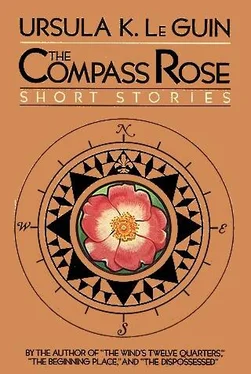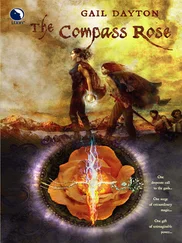Ursula Le Guin - The Compass Rose
Здесь есть возможность читать онлайн «Ursula Le Guin - The Compass Rose» весь текст электронной книги совершенно бесплатно (целиком полную версию без сокращений). В некоторых случаях можно слушать аудио, скачать через торрент в формате fb2 и присутствует краткое содержание. Жанр: Фантастика и фэнтези, на английском языке. Описание произведения, (предисловие) а так же отзывы посетителей доступны на портале библиотеки ЛибКат.
- Название:The Compass Rose
- Автор:
- Жанр:
- Год:неизвестен
- ISBN:нет данных
- Рейтинг книги:3 / 5. Голосов: 1
-
Избранное:Добавить в избранное
- Отзывы:
-
Ваша оценка:
- 60
- 1
- 2
- 3
- 4
- 5
The Compass Rose: краткое содержание, описание и аннотация
Предлагаем к чтению аннотацию, описание, краткое содержание или предисловие (зависит от того, что написал сам автор книги «The Compass Rose»). Если вы не нашли необходимую информацию о книге — напишите в комментариях, мы постараемся отыскать её.
From dream worlds to nightmare planets, through mazes of madness to tiny time holes in space, down Pathways of Desire to a New Atlantis, THE COMPASS ROSE points the way to the wonder-filled mind-country of a remarkable writer.
"As good as any contemporary at creating worlds, imaginary or our own… Le Guin writes with painstaking intelligence. Her characters are complex and haunting, and her writing is remarkable for it's sinewy grace."
—TIME Magazine
The Compass Rose — читать онлайн бесплатно полную книгу (весь текст) целиком
Ниже представлен текст книги, разбитый по страницам. Система сохранения места последней прочитанной страницы, позволяет с удобством читать онлайн бесплатно книгу «The Compass Rose», без необходимости каждый раз заново искать на чём Вы остановились. Поставьте закладку, и сможете в любой момент перейти на страницу, на которой закончили чтение.
Интервал:
Закладка:
I looked out the window at the dark city.
“We could completely decentralise industry and agriculture. Technology could serve life instead of serving capital. We could each run our own life. Power is power!… The State is a machine. We could unplug the machine, now. Power corrupts; absolute power corrupts absolutely. But that’s true only when there’s a price on power. When groups can keep the power to themselves; when they can use physical power-to in order to exert spiritual power-over; when might makes right. But if power is free? If everybody is equally mighty? Then everybody’s got to find a better way of showing that he’s right…”
“That’s what Mr. Nobel thought when he invented dynamite,” I said. “Peace on earth.”
He slid down the sunlit slope a couple of thousand feet and stopped beside me in a spray of snow, smiling. “Skull at the banquet,” he said, “finger writing on the wall. Be still! Look, don’t you see the sun shining on the Pentagon, all the roofs are off, the sun shines at last into the corridors of power… And they shrivel up, they wither away. The green grass grows through the carpets of the Oval Room, the Hotline is disconnected for nonpayment of the bill. The first thing we’ll do is build an electrified fence outside the electrified fence around the White House. The inner one prevents unauthorised persons from getting in. The outer one will prevent authorised persons from getting out…”
Of course he was bitter. Not many people come out of prison sweet.
But it was cruel, to be shown this great hope, and to know that there was no hope for it. He did know that. He knew it right along. He knew that there was no mountain, that he was skiing on the wind.
The tiny lights of the lantern creatures died out one by one, sank away. The distant lonely voices were silent. The cold, slow currents flowed, vacant, only shaken from time to time by a shifting in the abyss.
It was dark again, and no voice spoke. All dark, dumb, cold.
Then the sun rose.
It was not like the dawns we had begun to remember: the change, manifold and subtle, in the smell and touch of the air; the hush that, instead of sleeping, wakes, holds still, and waits; the appearance of objects, looking grey, vague, and new, as if just created—distant mountains against the eastern sky, one’s own hands, the hoary grass full of dew and shadow, the fold in the edge of a curtain hanging by the window—and then, before one is quite sure that one is indeed seeing again, that the light has returned, that day is breaking, the first abrupt, sweet stammer of a waking bird. And after that the chorus, voice by voice: This is my nest, this is my tree, this is my egg, this is my day, this is my life, here I am, here I am, hurray for me! I’m here!—No, it wasn’t like that at all, this dawn. It was completely silent, and it was blue.
In the dawns that we had begun to remember, one did not become aware of the light itself, but of the separate objects touched by the light, the things, the world. They were there, visible again, as if visibility were their own property, not a gift from the rising sun.
In this dawn, there was nothing but the light itself. Indeed there was not even light, we would have said, but only color: blue.
There was no compass bearing to it. It was not brighter in the east. There was no east or west. There was only up and down, below and above. Be-low was dark. The blue light came from above. Brightness fell. Beneath, where the shaking thunder had stilled, the brightness died away through violet into blindness.
We, arising, watched light fall.
In a way it was more like an ethereal snowfall than like a sunrise. The light seemed to be in discrete particles, infinitesimal flecks, slowly descending, faint, fainter than flakes of fine snow on a dark night, and tinier; but blue. A soft, penetrating blue tending to the violet, the color of the shadows in an iceberg, the color of a streak of sky between grey clouds on a winter afternoon before snow: faint in intensity but vivid in hue: the color of the remote, the color of the cold, the color farthest from the sun.
On Saturday night they held a scientific congress in our room. Clara and Max came, of course, and the engineer Phil Drum, and three others who had worked on the sun tap. Phil Drum was very pleased with himself because he had actually built one of the things, a solar cell, and brought it along. I don’t think it had occurred to either Max or Simon to build one. Once they knew it could be done, they were satisfied and wanted to get on with something else. But Phil unwrapped his baby with a lot of flourish, and people made remarks like, “Mr. Watson, will you come here a minute,” and “Hey, Wilbur, you’re off the ground!” and “I say, nasty mould you’ve got there, Alec, why don’t you throw it out?” and “Ugh, ugh, burns, burns, wow, ow,” the latter from Max, who does look a little Pre-Mousterian. Phil explained that he had exposed the cell for one minute at four in the afternoon up in Washington Park during a light rain. The lights were back on on the West Side since Thursday, so we could test it without being conspicuous.
We turned off the lights, after Phil had wired the tablelamp cord to the cell. He turned on the lamp switch. The bulb came on, about twice as bright as before, at its full 40 watts—city power of course was never full strength. We all looked at it. It was a dime-store table lamp with a metallised gold base and a white plasticloth shade.
“Brighter than a thousand suns,” Simon murmured from the bed.
“Could it be,” said Clara Edmonds, “that we physicists have known sin—and have come out the other side?”
“It really wouldn’t be any good at all for making bombs with,” Max said dreamily.
“Bombs,” Phil Drum said with scorn. “Bombs are obsolete. Don’t you realise that we could move a mountain with this kind of power? I mean pick up Mount Hood, move it, and set it down. We could thaw Antarctica, we could freeze the Congo. We could sink a continent. ‘Give me a fulcrum and I’ll move the world.’ Well, Archimedes, you’ve got your fulcrum. The sun.”
“Christ,” Simon said, “the radio, Belle!”
The bathroom door was shut and I had put cotton over the bug, but he was right; if they were going to go ahead at this rate there had better be some added static. And though I liked watching their faces in the clear light of the lamp—they all had good, interesting faces, well worn, like the handles of wooden tools or the rocks in a running stream—I did not much want to listen to them talk tonight. Not because I wasn’t a scientist; that made no difference. And not because I disagreed or disapproved or disbelieved anything they said. Only because it grieved me terribly, their talking. Because they couldn’t rejoice aloud over a job done and a discovery made, but had to hide there and whisper about it. Because they couldn’t go out into the sun.
I went into the bathroom with my viola and sat on the toilet lid and did a long set of sautillé exercises. Then I tried to work at the Forrest trio, but it was too assertive. I played the solo part from Harold in Italy, which is beautiful, but wasn’t quite the right mood either. They were still going strong in the other room. I began to improvise.
After a few minutes in E minor the light over the shaving mirror began to flicker and dim; then it died. Another outage. The table lamp in the other room did not go out, being connected with the sun, not with the twenty-three atomic fission plants that power the Greater Portland Area. Within two seconds somebody had switched it off too, so that we shouldn’t be the only window in the West Hills left alight; and I could hear them rooting for candles and rattling matches. I went on improvising in the dark. Without light, when you couldn’t see all the hard shiny surfaces of things, the sound seemed softer and less muddled. I went on, and it began to shape up. All the laws of harmonics sang together when the bow came down. The strings of the viola were the cords of my own voice, tightened by sorrow, tuned to the pitch of joy. The melody created itself out of air and energy; it raised up the valleys, and the mountains and hills were made low, and the crooked straight, and the rough places plain. And the music went out to the dark sea and sang in the darkness, over the abyss.
Читать дальшеИнтервал:
Закладка:
Похожие книги на «The Compass Rose»
Представляем Вашему вниманию похожие книги на «The Compass Rose» списком для выбора. Мы отобрали схожую по названию и смыслу литературу в надежде предоставить читателям больше вариантов отыскать новые, интересные, ещё непрочитанные произведения.
Обсуждение, отзывы о книге «The Compass Rose» и просто собственные мнения читателей. Оставьте ваши комментарии, напишите, что Вы думаете о произведении, его смысле или главных героях. Укажите что конкретно понравилось, а что нет, и почему Вы так считаете.




